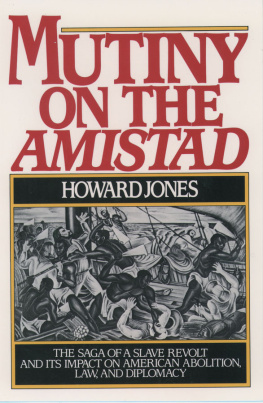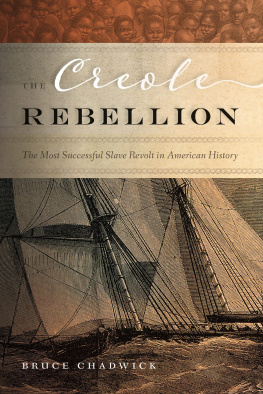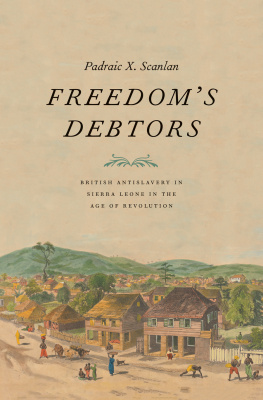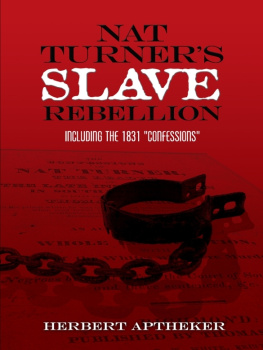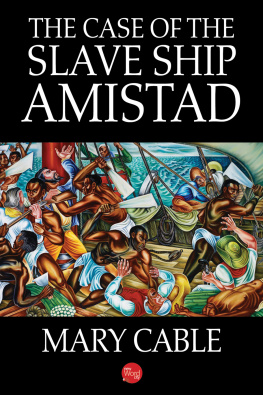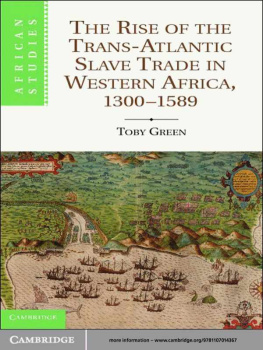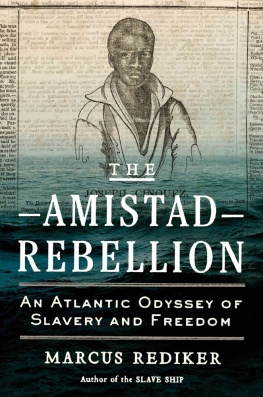Published by State University of New York Press, Albany
2012 State University of New York
All rights reserved
Printed in the United States of America
No part of this book may be used or reproduced in any manner whatsoever without written permission. No part of this book may be stored in a retrieval system or transmitted in any form or by any means including electronic, electrostatic, magnetic tape, mechanical, photocopying, recording, or otherwise without the prior permission in writing of the publisher.
For information, contact State University of New York Press, Albany, NY
www.sunypress.edu
Production by Eileen Meehan
Marketing by Anne M.Valentine
Library of Congress Cataloging-in-Publication Data
Christensen, Matthew J.
Rebellious histories: the Amistad slave revolt and the cultures of late twentieth-century black transnationalism / Matthew J. Christensen.
p. cm.
Includes bibliographical references and index.
ISBN 978-1-4384-3969-3 (hardcover: alk. paper)
1. Slave insurrectionsUnited States. 2. Amistad (Schooner). 3. Influence (Literary, artistic, etc.)History20th century. 4. Antislavery movementsUnited States. 5. Sierra Leonean literature. 6. Sierra LeoneHistory. I. Title.
E447.C48 2011
326'.80973dc22
2011008544
10 9 8 7 6 5 4 3 2 1
Acknowledgments
Rebellious Histories explores the problem of late-twentieth-century popular cultural deployments of the 1839 Amistad slave rebellionand the transatlantic slave trade against which it was directedas a historical and allegorical antecedent to contemporary forms of resistance to global capitalism. My curiosity about the scope of the Sierra Leonean and American resurrection of the Amistad slave rebellion in this period and about the critical contours of the body of texts that emerged was sparked while I was a Kalamazoo College undergraduate on a study abroad program at Fourah Bay College in Sierra Leone from 1990 through 1991. It was there, in a course taught by Joseph Opala, that I first learned about the rebellion, and it was there that I first saw Amistad Kata-Kata, Charlie Haffner's dramatic rendition of the shipboard revolt. I was initially drawn to the historical narrative for personal reasons. As a twenty year old trying to make sense of my subject position as a white man with U.S. citizenship in a deeply impoverished country such as Sierra Leone, I found that the Amistad rebellion historicized the problems of privilege, power, and global capitalist violence that I was grappling with. I did not think much about the rebellion again until the late 1990s after an education in postcolonial studies and transnational cultural studies gave me a critical framework to recognize the unique and richly multivalent perspectives on the intertwined effects of the slave trade, colonialism, and contemporary global capital flows that writers such as Haffner in Sierra Leone and Clifford Mason and Barbara Chase-Riboud in the United States were exploring with their historical fictions. While this book is rooted in my personal quest to understand my place in the world, it is ultimately a testament to their aesthetic and political endeavors.
With such a long gestation, Rebellious Histories and its author owe many individual and institutional debts. I am particularly grateful for the early support and critical engagement of Richard Yarborough, Donald Cosentino, Shu-mei Shih, and the late Teshome Gabriel. My most enthusiastic champion, my most dedicated reader, and my most insistent voice of ethical consciousness remains Shirley Jennifer Lim. She never let me forget that I was writing this book for people whose struggles deserve a broader audience.
Joseph Opala deserves a hearty thank you for being the first to teaching me the history of the Amistad revolt, as he has for many others in Sierra Leone and elsewhere. Joe also introduced me to many of the Sierra Leonean writers and artists discussed in this book. Without their acquaintance, Rebellious Histories would not have come into being. For similar reasons I thank Iyunolu Folayan Osagie for her work recovering forgotten Amistad revolt histories in Sierra Leone and the United States and for generously sharing a copy of The Broken Handcuff, Raymond DeSouza-George's unpublished play about the rebellion.
Without generous financial and institutional support Rebellious Histories would be little more than an idea. The following institutions and organizations provided support at crucial moments: the West African Research Association; Princeton University's Center for African American Studies; Columbia University's Center for the Study of Ethnicity and Race; Australia National University's Humanities Research Centre; the James S. Coleman African Studies Center at UCLA; the University of California Office of the President; SUNY Stony Brook's History Department; and the University of Texas-Pan American's Faculty Research Council, Faculty Development Leave Program, Department of English, and College of Arts and Humanities. In particular, I would like to thank Valerie Smith, Ed Keller, Jennifer Yanco, Gary Okihiro, Debjani Ganguly, my department chairs Steven Schneider and Pamela Anderson-Mejias, and deans Rudolfo Rocha and Dahlia Guerra for providing me an intellectual home in these institutions. Special recognition goes to Liza Porras, Nora Duran, Elena Reyna, Alma de la Rosa, Kerry Allen, Leena Messina, the WARA staff in Dakar, and all of the other overworked office managers and administrative assistants who went out of their way to take care of paperwork and other bureaucratic procedures during the long periods I was away from various campuses. My abiding appreciation also goes to the various archivists and staff members at the British Library Newspaper Library, the Gilder Lehrman Library, the Schomberg Center for Research in Black Culture, the Institute for Sierra Leonean Cultural Studies at Fourah Bay College, the Sierra Leone National Library, the Freedom Archives in San Francisco, and Bolerium Books, also in San Francisco. I am also deeply grateful to Charlie Haffner and Raymond DeSouza-George for sharing their time and personal papers.
This is a better book with images by Tim Waites and Konrad Tuchscherer. I want to thank them and the New Haven Museum for permission to include their photographs of Amistad-related artwork. I also want to thank the Sierra Leone Adult Education Association for permission to reprint Waites' photographs, which originally appeared in Joseph Opala's book Ecstatic Renovation! Street Art Celebrating Sierra Leone's 1992 Revolution. I am equally grateful to Indiana University Press Journals for permission to reprint an earlier version of , Enslaving Globalization: Slavery, Civil War, and Modernity in Sierra Leone, The Global South 2, no. 2 (Fall 2008): 5474.
I have benefited intellectually, professionally, and emotionally from friends and colleagues. I do not know how to express my appreciation for their interlocutions, incitements, cajoling, conversation, companionship, dinner parties, happy hours, procrastinations, and lessons about the world without sounding saccharine, so in no particular order, I thank Simon Gikandi, Jennifer Wenzel, Lloys Frates, Victoria Sams, Jim Wallace, Eileen Julian, Eustace Palmer, Abioseh Porter, Patrick Muana, Chris Corcoran, Gail Griffin, Laura Murphy, Rachel Gabara, Daphne Brooks, Danika Brown, Rebecca Mitchell, Sandhya Shukla, Cynthia Schmidt, Katherine Sugg, Ira Livingston, Cynthia Tolentino, Manthia Diawara, Mbye Cham, Abu-Hassan Koroma, Kathleen Wilson, Nick Mirzoeff, Ned Alpers, Ali Behdad, Susette Min, David Eng, Abubakar Kalokoh, Arrow Bokarie, Mary Dillard, Gibril Cole, Jasamin Rostam-Kolayi, Tamara Ho, Katherine King, Sondra Hale, Susanna Wing, Mike Miller, Mercedes Ibarra, Mark Quigley, Sanda Lwin, Farhad Karim, Sue Englander, John Durham, Gisele Fong, Arleen DeVera, Dennis Laumann, Cymone Fourshey, Linda Murray, Marilyn Manners, Gary Marker, Mike Mahoney, and Russell Schuh. I would also like to thank my current and former colleagues at University of Texas-Pan American, especially Debbie Cole, David Anshen, Jose Skinner, Gary Schneider, Dora Ramirez-Dhoore, Caroline Miles, Rebekah Hamilton, Lynda Nuss, Ed Cameron, Linda Belau, Angela Vergara, Barbara Vielma, Marilu Salazar, and the late Lee Davinroy for their intellectual engagement and support.


